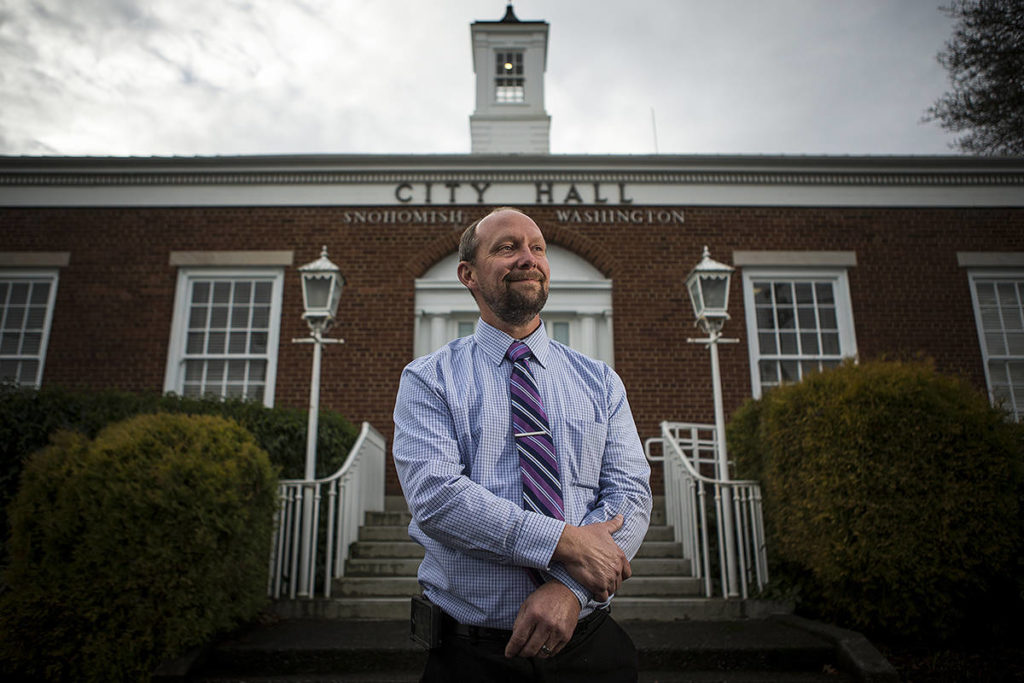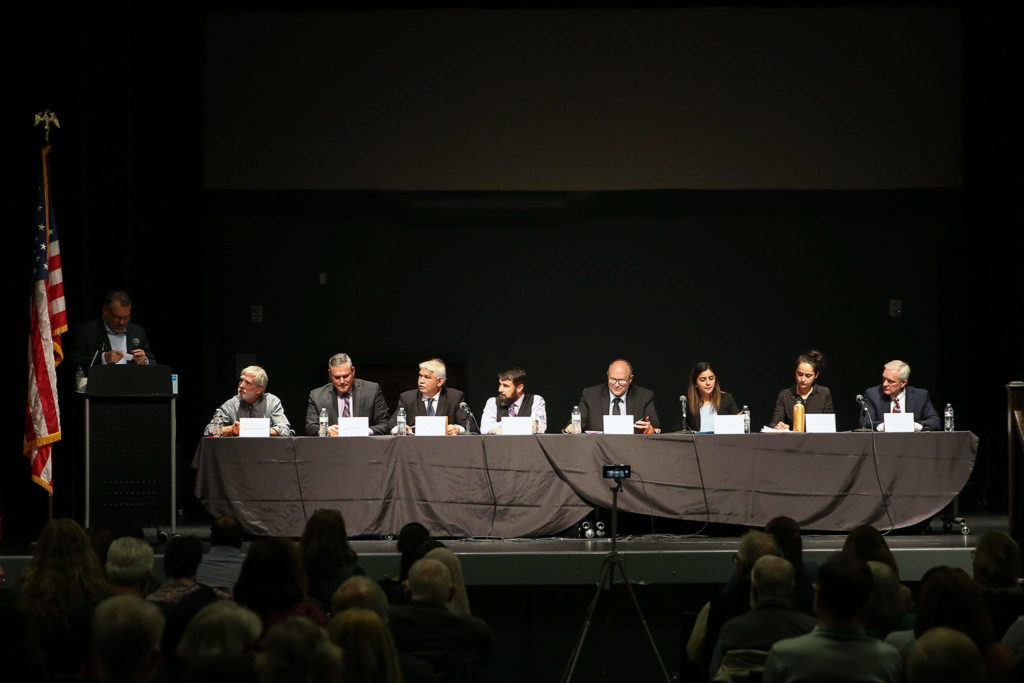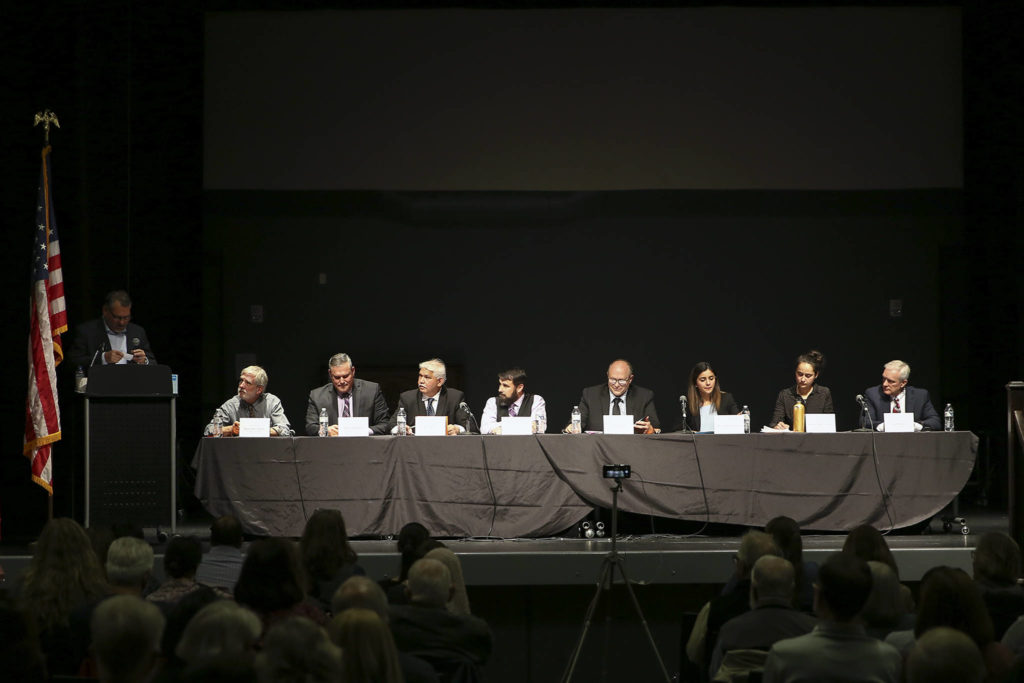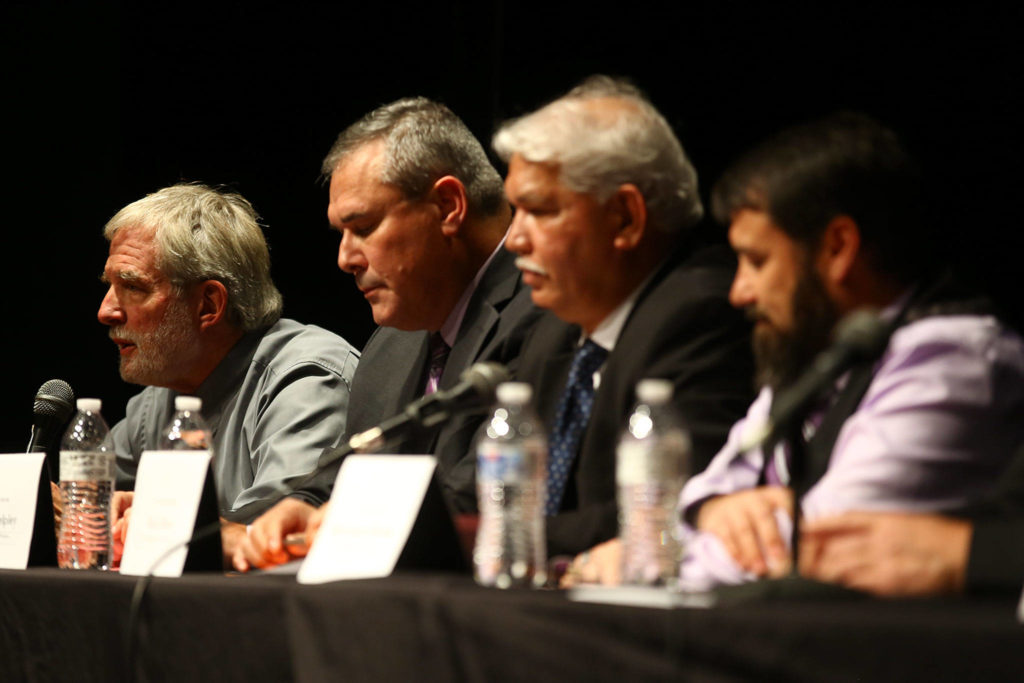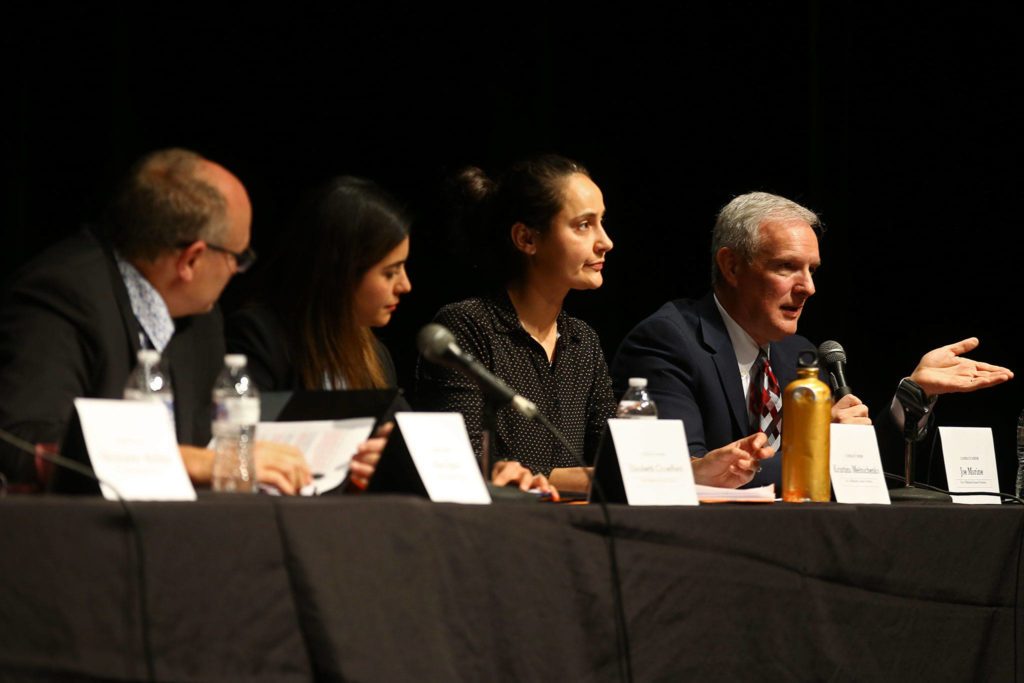MUKILTEO — If Proposition 1 passes, Jennifer Gregerson will be out of a job.
She’ll lose her gig as the city’s CEO and ceremonial head that pays $70,000 a year, plus benefits.
It comes with no set office hours, which means she could theoretically roll in on her bike whenever she pleases, play Pokémon GO for hours or parle français with her French boyfriend to her heart’s content.
But that’s not what the two-term mayor does all day. Nor is it why she opposes changing the form of government from strong mayor to council-manager, an issue that voters will decide on Nov. 5. It would mean the chief executive of Mukilteo would be a city manager hired by the council.
“You can have a city manager, but it’s never the same as when voters choose that person,” said Gregerson, 41, walking along the waterfront at Lighthouse Park on an autumn afternoon with blue skies and seagull chatter.
Wearing sunglasses and a puffy coat, she looked more pedestrian than mayoral. Nobody stopped her to talk trash pickup or speedbumps. That often happens when she goes to the QFC. As an elected official, she welcomes citizen input, whether it’s in the produce aisle, City Hall or on the Pokémon GO trail.
“Residents feel like they have someone they can turn to who is accountable to them specifically,” she said. “There is a value knowing there is someone who can put in the time for regional outreach and have a voice there. Being able to meet with other big players.”
As mayor, she also leads the city in times of tragedy, such as the deadly shooting of three students at a house party in 2016.
The City Council voted in May in favor of putting a proposition on the ballot to change the decades-old structure of a strong mayor. The measure passed 4-2 by council members, some who are often at odds with the mayor.
In Washington, the leading form of local government is mayor-council, according to the Municipal Research and Services Center.
About 50 of the 281 cities statewide have a council-manager, including Mill Creek and Mountlake Terrace, which are similar in size to Mukilteo.
The city of Snohomish went the other direction when voters, by a narrow margin, switched to a mayor-council system. Snohomish Mayor John Kartak took office in 2017.
As he put it: “I prefer the strong mayor-council form based on the U.S. Constitution which provides clear separations of legislative and executive power and best serves the consent of the governed. The council-manager form invests 100 percent of the political power into only one branch of government.”
Neither form guarantees success, though.
“We have all seen when both forms of government have worked well and not so well. Either way, the key ingredient is people and the level of professionalism and character they have to offer,” he said.
Granite Falls shifted to a council-manager in 2016. Matt Hartman, a five-term councilmember, was selected to be what he calls the “weak” mayor.
“It suits me perfectly because I was not qualified or interested in running a city,” said Hartman, a real estate broker.
He said the council-manager system suits the town.
“If that person fails to see our vision, fails to work with our goals, then contractually, it’s either 30 or 60 days, they can be gone,” Hartman said. “If you elect a mayor you are then stuck with someone for four years.”
His duty as mayor?
“You chair the meetings, you sign the ordinances, you attend other functions as the mayor,” he said. “And you kiss babies in the parade. I don’t know if it’s officially in the job description, but it might be a parenthetical phrase.”
Running the city
If Prop. 1 passes, the change in governance would take effect the day the election results are certified.
“We have spent hundreds of hours preparing for the ‘what if,’” Gregerson said. “Changing the city code and some procedures and policy. The council will need to select an interim city manager.”
The city manager would hire staff. The council would select one of its members to serve as “mayor” on a rotating basis. Gregerson would stay on as a council member for two years, the remainder of her term. That pays $6,000 a year.
Councilman Scott Whelpley, who is up for re-election, proposed the measure for council-manager, saying at the time: “Now is the time for us to be able to take control back of our town. Remove the politics.”
He later added: “It’s not just this current administration, it’s the previous one and the one before that.”
The measure was supported by Councilwoman Anna Rohrbough, who proposed a vote of no confidence against Gregerson in 2018, in response to what she described as the mayor not informing the council of severance payments and other spending decisions.
Rohrbough is a candidate for the Snohomish County Council District 2 seat against Megan Dunn. In the primary, Rohrbough, who ran as a Republican against seven Democrats, including Gregerson, got the most votes.
Gregerson explained her motive for vying for the county seat, which pays $127,000 a year: “I had hoped to represent the region and work on land use, housing and public safety.”
She placed third, which meant she didn’t advance to the primary.
Political start
Gregerson grew up in Mukilteo, a bedroom community with some 21,300 residents. Her parents, Bill and Jill, still live here. They join her on Pokémon GO meetups. So, too, does her boyfriend, who she met in a French conversation group. He’s a tutor and a Frenchman.
She also is internet ordained to officiate at weddings, four so far. Two were for friends, including a recent trip to Greece. The other two were for people with ties to the community, but it wasn’t part of her mayoral duties.
Gregerson went to New York University after graduating from Kamiak High School. She has a master’s degree in urban planning.
“In college I worked on the yearbook and served on the student council. I learned what it was like to be part of a meeting where people were making decisions,” she said.
She moved back in 2001 for a yearbook company job, which she still does as a sideline.
“I got interested in city issues,” she said. “I was on council for 10 years. I ran three times.”
She was first elected mayor in 2013. “I didn’t think I was going to win,” she said.
During her terms, ferry terminal construction began and Paine Field opened for commercial airport service, which she opposed.
“Over time we fought what we could but it’s here now. We have to live with it. I have used it. It is convenient. It is what it is. It’s not going away,” she said. “It’s the right size and shouldn’t get bigger. It has a big impact on those neighborhoods in the flight paths. They hear the planes and it bothers them.”
The waterfront project “has been part of my public service the last 15 years,” she said.
“The public access along the promenade and past the terminal will give everyone in the community the chance to appreciate the building, the artwork and the views. They will have a new unique view of the waterfront.”
Among other things, she is proud of the Harbour Reach Corridor Project: “It will help with traffic congestion on the speedway. It will have pedestrian and bike access. It will build a connection of our neighborhood between Beverly Park and Harbour Pointe Boulevard. We are going to bid very soon with construction early next year.”
Nothing prepared her for the 2016 shooting at the house party with Kamiak High School graduates. Killed were Anna Bui, Jake Long and Jordan Ebner.
“The shooting and deaths of Anna, Jake and Jordan was so significant in our community, and unimaginable for their families. It shaped my experience as a leader and mayor. Leading through that trauma was something I never expected and was life-changing.”
Pros and cons
The best government format is something every town needs to figure out for itself, and one that citizens have varying opinions about.
Mario Lotmore co-wrote the argument against changing from strong mayor for the Voters’ Pamphlet.
Lotmore, who regularly attends City Council meetings, said Prop. 1 stems from friction between some members and the mayor.
He said a council-manager reduces transparency and would increase administrative costs.
“The politics go from an external politics between the mayor and the council to an internal politics between the council and the city manager,” Lotmore said. “All the politics which were visible now becomes behind closed doors, to the detriment of the citizens.”
Glen Pickus helped write the guide’s pro statement.
“It ensures professional delivery of services and has the improved oversight by our elected representatives, the City Council, and they are accountable to the voters,” Pickus said. “The skills that it takes to get elected mayor are not the skills that it takes to run a city government.”
Pickus worked in the city’s planning department until 2016.
“My efforts are not anything personal against Mayor Gregerson. When I worked in Mukilteo, I enjoyed working for her,” he said. “It’s more a systemic problem.”
Council-manager is not without drama.
“A lot of people point at Mill Creek as the bad story. For every bad story about a city manager I can point to you an equally horrifying mayor story,” Pickus said. “Mukilteo voters should ignore all that and pick what they think is best for the city.”
Ballots must be postmarked no later than Nov. 5 or deposited in one of the county’s 22 designated drop boxes open around the clock until 8 p.m. on election day. There were 14,300 ballots issued for the general election within Mukilteo city limits.
Andrea Brown: abrown@heraldnet.com; 425-339-3443. Twitter: @reporterbrown.
Talk to us
> Give us your news tips.
> Send us a letter to the editor.
> More Herald contact information.



